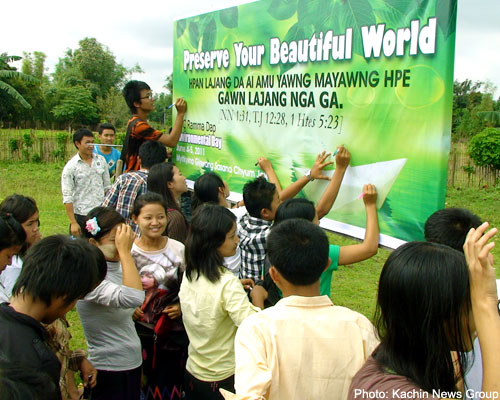Over 1,000 Kachin Baptist youth marked the June 5th World Environment Day with special a program in Myitkyina, the capital of Kachin State, Northern Burma, organizers said.
Under the title of “Preserve Your Beautiful World”, participants took part in five competitions related to the environment such as poetry, features, cartoons, painting (art) and photography, as well as a traditional Christian prayer service at Gies Memorial Baptist Church in downtown Myitkyina.
 The event was conducted by the Youth Department of the Kachin Baptist Convention (KBC) and it was also joined by some non-governmental organizations in the Kachin capital, according to KBC youth leaders.
The event was conducted by the Youth Department of the Kachin Baptist Convention (KBC) and it was also joined by some non-governmental organizations in the Kachin capital, according to KBC youth leaders.
A day before the anniversary day, on June 4, Kachin Baptist youth also planted over 300 saplings at the compound of the Myitkyina Zonal Missionary School, in Ra Da Kawng Village, in Tatkone Quarter, three miles north of Myitkyina, participants said.
“At the present, damage to the environment is on the increase in Kachin State, so the message of this conference to young people was to teach them how to protect the environment,” a general secretary of the KBC’s Youth Department said.
Nhkum Tang Gun, KBC Youth Leader, gave a special presentation on the environment to the participants.
Deforestation and damage to other natural resources are increasing as more Chinese companies entered Kachin State after the ceasefire between the Kachin Independence Organization (KIO) and the Burmese military government in 1994.
The deforestation has happened on the eastern side of the Mali River, and the Irrawaddy River, the longest river in Myanmar, has turned red in color because of gold mining in the area, said Ms. Ah Nan, Spokesperson of the Kachin Development Networking Group (KDNG).
“Before constructing the Myitsone Dam, on the Irrawaddy River, the government allowed digging for gold with heavy machines. That is making the river red in color. In Hpakant (Jade Land), the mountain was demolished within one month and throwing soil into the river caused flooding during raining season, which is having a bad impact on the environment,” said Ah Nan.
She said, in the Hukawng Valley, in Eastern Kachin State, the Burmese government-backed Yuzana Company’s use of chemical fertilizer on tapioca plantations is a danger to wild animals.
The extension of mono crop plantations using chemical fertilizers around Kachin State after 1994 also damaged the environment, according to a local environmentalist in Myitkyina.
China and Burma are co-operating on the construction of a huge dam at the Irrawaddy River’s confluence, where the Irrawaddy is joined by the Mali Hka River and N’Mai Hka River, despite opposition from the Kachin people.
KDNG warns flooding caused by the breaching of the Irrawaddy Dam will hit millions of people downriver.



